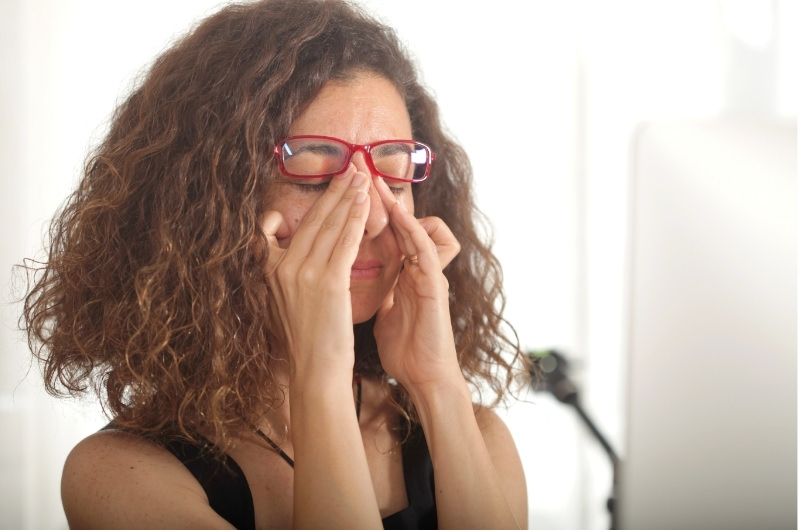Eye clicking is usually a normal scenario that happens when hidden air tries to escape from beneath your eyelid as you rub your eye. While this clicking noise can be expected as a natural phenomenon, certain diseases include such noise as a symptom, such as Hay Fever. The best way to treat any irritation in your eyes is by flushing out your eyes with warm water. You can also resort to other home remedies by getting a good night’s sleep and limiting caffeine. Sometimes the clicking noise that you hear can be an outcome of a condition called head noise, which you will most definitely need to talk to your doctor about.
Your pair of eyes are the most fragile sensory organ of your body. Even the tiniest speck of dust or germ once making its way into your eye can cause irritation and infections. This highlights the importance of eye health.
While the clicking noise, just like many kinds of noises that your body may emit, is completely natural, there are rare instances in which it can develop into a more serious stage.
Why does your eye make a clicking noise when you rub it? Can the clicking noise hint at a pre-existing condition or disease? How can you treat your eye clicking when it’s involved with twitching as well?
Why should you flush out your eyes, and how do you do it? What is head noise, and how do you treat it? Can your eye-clicking noise be just in your head?
Why does your eye make a clicking noise when rubbed?
Your eyelids pretty much act like a windshield wiper of a car and protect the surface of your eyes with the tear film. The tear film is an exclusive slim layer of fluid about 3μm (micrometer) thick.
You may not know that there is also air straight outside your tear film, which can cause little quantities of air to make their way behind your eyelids.
In this kind of situation, when you add a bit of pressure to your eyelids, like rubbing it or maybe even with repetitive fast blinking, your eyelid will emit a clicking noise.
This is mainly because the trapped air beneath your tear film escapes when you squeeze your eyelids tightly shut.
This is a completely normal reaction, and it goes away after a while. The best way to handle this is by stopping yourself from rubbing your eyes and letting your eye rest for a few minutes.
Can the clicking sound be a symptom of a disease?
The clicking noise in the eye when rubbing is completely harmless unless you’re experiencing other symptoms along with it, such as bad eye irritation, gritty eyes, or floating spots or strings in your vision.
In these rare instances, the click can actually be a symptom of an underlying eye condition.
The possible eye diseases and other symptoms apart from eye clicking noises that classify under the disease are best studied through a table.
Let’s have a look below:
| Eye complications | Symptoms apart from ‘eye clicking’ |
|---|---|
| Pink eye (Conjunctivitis) | Eye redness, swollen eyelids, watery eyes, itchiness, and sensitivity to light |
| Dust exposure | Runny nose, cough, tightness in the chest |
| Dry eyes | Eye stinging and strain, eye pain, and blurred vision |
| Retinal detachment | Bright flashes of light in your vision, floaters, blind spots |
| Foreign objects like dirt, sand in the eye | Difficulty opening eyes, eye-itchiness, eye pain, and sometimes bleeding |
| Hay fever | Watery and itchy eyes, sneezing, and temporary loss of smell and taste. |
How to treat your eye clicking if it involves twitching?
If you’re experiencing a certain discomfort of eye twitching apart from the annoying clicking noise, it could mean that your eyes are mildly irritated. There could be several reasons for this.

It could be due to eye stress from not getting enough sleep, too much caffeine, allergies, dry eyes, and poor nutrition. These problems are, of course, treatable at home itself.
- Eye relaxation – For this, it’s best if you keep your phones and laptops away for a while and just give your eyes a break.
- Warm compress – These are quite refreshing to your eyes and are recommended by The University of Michigan Medicine. While doing this, you can also try softly massaging your eyelids with clean fingers.
- Limit caffeine – Yes, this means that you’ll have to say no to that extra cup of coffee you’ve been taking.
- Sleep – Sleeping is the most natural way of giving your tired eyes a well-deserved rest.
- Eye drops – This is the best option for irritated or dry eyes as it slows down eyelid muscle contractions and can almost immediately provide relief.
Why and how should you flush out your eyes?
It’s important to take steps by yourself to properly protect your eyes, although it is the main task of your eyelashes and eyelids.
Once in your eyes, foreign objects like dirt, dust and sand particles, and even liquids can remain there unless you specifically flush them out. This is also a useful habit to learn and practice when your eyes experience an unusual dryness or are irritated.
The first step would be to sanitize your hands, preferably with warm water and soap. Next, you can place yourself in the shower and allow comfortably warm water to flow down your forehead, onto your eyes.
While doing this, try and keep your eyes open for as much as possible.
You could also do this by bending over your sink. Be mindful to slightly tilt your head to a side so that the warm water can easily reach your eye.
You can also try filling a wide pan with water and dipping your face into it while blinking.
Is the clicking noise in your head?
If you feel like you’ve explored all the possibilities that the clicking sound could mean and that it seems to be a noise emitting from within your head unusually, the chances are that it could be a result of a condition known as Tinnitus.
This is actually a very common disease, according to a 2018 study that states that about 25.3% of the United States population are going through it.
Tinnitus, also known as head noise, is a sort of ‘clicking’ or ‘ringing’ or ‘buzzing’ noise that can only be heard by the person experiencing it.
Causes of this condition extend to medication side-effects, blockages in the ear canals, head or neck issues, and it could even be just a part of your aging process.
While there is no exact cure found for Tinnitus, there are various treatment options available, like hearing aids. These hearing aids help amplify the sounds of the environment and help you hear real sounds instead of unreal sounds caused by Tinnitus.
For this purpose, even sound maskers and white noise machines can be brought to help ignore head noises.
You should always seek medical assistance when it comes to this disease since, if untreated, you may run the risk of experiencing dementia.
Conclusion
According to the US National Library of Medicine, many complications and diseases involving the eye can harm your vision.
And even a mild vision impairment can have a substantive bad effect on your quality of life.
This is exactly why you’ll need to take your eye health seriously in instances where it’s not just the clicking noise that you’re experiencing.
While most of us tend to naturally postpone our eye doctor appointments, it may be about time you turn yourself back on track with your appointments.


